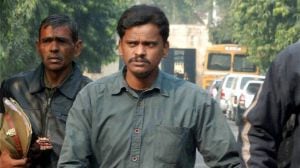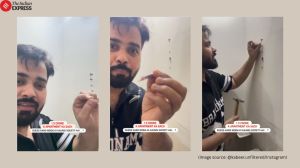Gujral, Sharif warm up with new hotline
GROUND-BREAKING DECISIONS *Joint working groups to be set up to handle all outstanding issues including Kashmir.*A hotline to be set up bet...

GROUND-BREAKING DECISIONS
*Joint working groups to be set up to handle all outstanding issues including Kashmir.
*A hotline to be set up between the two prime ministers.
*Civilian prisoners such as fishermen to be exchanged.
*Agreement to be reached on visa, travel and people-to-people contact.
*Code of conduct for diplomats to be strictly observed, both to end hostile propaganda.
*Both countries to identify confidence-building measures.
*India offers to buy surplus power from Pakistan.
*Both foreign secretaries to meet in Islamabad towards the end of May.
*Foreign secretaries will set up mechanism and methodology to deal with outstanding issues.
KURUMBA ISLAND (Maldives), May 12: The “step-by-step” script was followed to perfection as Indian and Pakistani prime ministers today dared to break the ice after nearly a half decade’s freeze on relations.
No side was willing to openly call it a breakthrough but it was the first time since 1989 that they had not returned from a round of talks kicking and screaming. There were several significant agreements (see graphic) but none more important than two prime ministers “directing” their foreign secretaries to “follow up” on the broad understanding reached today.
Disagreement, if any at the end of the day, surfaced only in that the Pakistani side made much of their claim that India had agreed to also set up a joint working group (JWG) to look at the “core” issue of Kashmir in its entirety. India’s Foreign Secretary Salman Hyder played this down, suggesting it was fine for the Pakistanis to reflect their “preoccupations”. But the fact is that it was the first time since the trouble erupted in Kashmir in 1989 that an Indian Prime Minister had agreed to Kashmir on the talks agenda though there is an obvious difference of opinion on the two sides as to the implications of this development.
For the past many years, the Indian and Pakistani positions have been frozen on this question. India, taking the cue from Deng Xiao Ping’s immortal advice to his own country and Japan to freeze their border dispute “for a wiser generation” has suggested that Pakistan agree to move on a phased plan to increase people-to-people contact and better confidence building measures (CBM). The way India and China have proceeded with their own peace process, with JWGs looking at the issues of the border dispute, troop pullout, etc., has been held out as an example.
Pakistan on the contrary asserts that Kashmir is the core issue and without a solution there everything is of no consequence. Today’s agreements accommodates both positions.
Now the two foreign secretaries could meet by mid-June and set up several working groups including one on Kashmir. There is no compulsion then to ensure that all of them move towards a resolution at the same place. Nawaz Sahrif could then tell his people that he has initiated formal negotiations on Kashmir, something none of his predecessors, elected or otherwise, could achieve since the mid-’60s. He is however under no compulsion to ensure that the Kashmir group move as fast as, say, the joint groups working on trade, people-to-people contact, and Siachen.
Given the history of India-Pakistan negotiations, several things could go wrong between now and mid-June and subsequently as the passes in Kashmir reopen. But if body language and atmosphere are any indication, this summit, though much less spectacular than the one in 1988, promises to deliver more in the long run.
Since a hotline already exists between the two Directors General of Military Operations, one more between the prime ministers may not mean so much more. But why it is important is because of the message it sends out to the rivals on the two sides in the brass and the bureaucracy: That the two prime minister endorse the new spirit of subcontinental detente and that, if need be, they could exchange notes directly as well.
Similarly, the positive moves on the exchange of prisoners, civilised treatment of diplomats, eschewing hostile propaganda on the sponsorship of cross-border terrorism are expected to send the right signals to the officials down the line on both sides.
Never since 1988 have the Indian and Pakistani prime ministers shown so much affection for each other in public. There was much talk today of a “great historic moment” that “must not be lost.” Gujral, predictably used his favourite Faiz Ahmed Faiz line: “Guftagu band na ho, baat se baat chaley (let discussions never break down, let one thing lead to another.)
The difference this time could be that the two leaders are experienced, unhurried and therefore realistic about what could be achieved in so complicated a situation in so short a time. Even if they do not decide on a summit again soon, they are bound to meet again at the Commonwealth Heads of Governments summit at Edinburgh this year and therefore it is crucial now that they do not allow their respective bureaucracies to lapse into the compulsive and old stalling tactics.



- 01
- 02
- 03
- 04
- 05




























